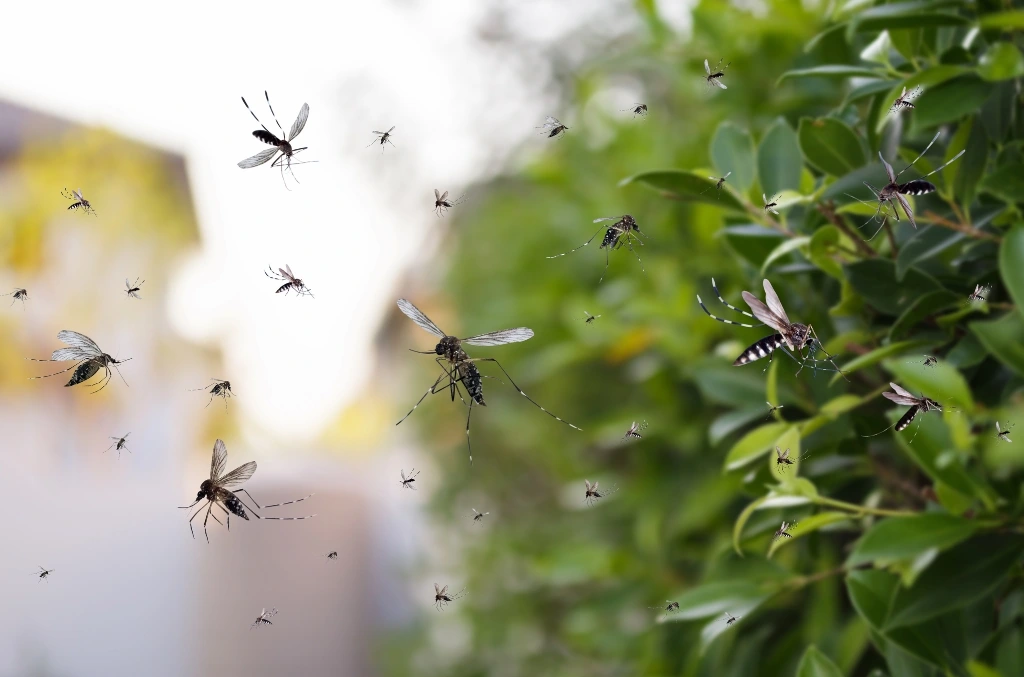
The Plants Can Help Keep Mosquitoes Out of Your Yard
Even the most beautiful summer nights can be quickly spoiled by swarms of mosquitoes. Worse still, most traditional insect repellents you might reach for may contain harsh, irritating, and even toxic ingredients. If you’re looking for more natural ways to keep these blood-sucking insects out of your yard, we recommend using some of the most tried and true natural repellants around — Plants. Indeed, insects are attracted to plants so strategically planting an array of flowers and herbs can discourage mosquitos from invading your yard.
Each of the best plants to deter mosquitoes is not only effective, but they add beauty and fragrance that can elevate your outdoor space instantly. Join the pest control professionals at A-1 Pest Control as we share a list of the best plants to deter mosquitos from your yard this season.
Table of Contents
What Are the Best Plants to Deter Mosquitoes
Some of the best plants to deter mosquitoes are renowned for their ability to repel these critters, while others are unsung heroes that haven’t yet gotten their due credit.
Citronella
When it comes to the best plants to deter mosquitoes, citronella grass is perhaps the most well-known. Its distinct citrus scent masks the other odors that may lure mosquitoes. Plant it in well-draining soil and place it in containers to enjoy on patios and decks.
Lavender
Best known for its calming aroma, lavender is a versatile and attractive addition to any garden. Besides its pleasant scent, lavender also repels mosquitoes and other insects. Plant it in sunny areas with well-drained soil.
Basil
Those who love it as a kitchen staple will be happy to know that basil doubles as one of the best plants to deter mosquitoes. The strong aroma of this herb can help keep mosquitoes at bay. Growing basil in pots or as a companion plant in vegetable gardens will help prevent mosquitos from taking over your yard.
Marigold
Vibrant and colorful, marigolds not only add a pop of color to your garden but also contain pyrethrum, a natural insect repellent. Plant marigolds in sunny locations to deter mosquitoes and other pests.
Peppermint
With its refreshing scent, peppermint can also be a natural mosquito deterrent. Grow it in pots to prevent it from spreading too aggressively. Crushing the leaves and rubbing them on your skin can also provide a temporary natural repellent.
Rosemary
A versatile herb in the kitchen, rosemary also serves as a mosquito repellent. Its woody fragrance is known to keep these buzzing bothers away. Plant rosemary in well-drained soil and ensure it receives plenty of sunlight.
Chrysanthemum
Chrysanthemums contain pyrethrin, a natural insect repellent commonly used in mosquito repellent products. Plant chrysanthemums in pots or garden beds to help control mosquito populations.
Catnip
Catnip contains a compound called nepetalactone, which is a natural insect repellent, making it one of the best plants to deter mosquitoes.
Geranium
Scented geraniums emit a fragrance that mosquitoes find unpleasant. Plant them in pots or garden beds to enjoy both their attractive blooms and insect-repelling properties.
Lemon Balm
A member of the mint family, lemon balm has a lemony scent that mosquitoes dislike. Plant it in containers or as a ground cover to create a fragrant and mosquito-resistant area.
Other Natural Mosquito Repellents
If your garden space is a little limited, or if you lack a green thumb, you might want to opt for another natural mosquito repellant option. Each of these gives the even best plants to deter mosquitoes a run for their money.

Essential Oils
Essential oils are extracted from plants, so it stands to reason that their aroma would be as effective a repellent as the plants themselves. Try some of these in a diffuser or a candle to deal with mosquitoes in your yard.
- Citronella Oil: Derived from lemongrass, citronella oil is a well-known natural mosquito repellent.
- Lemon Eucalyptus Oil: This essential oil contains citronellal, which has been found to be effective in repelling mosquitoes. You can even mix it with a carrier oil and apply it to exposed skin.
- Peppermint Oil: The strong scent of peppermint is a natural deterrent for mosquitoes. Dilute with a carrier oil and apply to pulse points or mix in a spray bottle with water for a refreshing mist.
Herbs and Spices
Along with basil, some herbs and spices can be employed as a method of keeping insects away.
Mosquitoes hate the odor of garlic, so much so that consuming garlic or incorporating it into your diet may help repel mosquitoes from the inside out. Lavender can be dried and placed in sachets to repel mosquitoes and enjoy the calming aroma. The strong scent of cinnamon can be a natural mosquito deterrent, and mint leaves emit a strong scent that mosquitoes dislike. Crush or grind them up to get the most effective repellent.
Fruit Peels
Save your citrus peels, including those from lemons, oranges, or grapefruits, and either grind them up or chop them up into small pieces to scatter in your yard. The natural oils in the peels act as a mosquito deterrent.
Vinegar
While the smell may not be everyone's favorite, apple cider vinegar can be an effective mosquito repellent. Mix with water and apply to the skin or create a solution to spray in outdoor areas.
Oils
Derived from the neem tree, neem oil has natural insecticidal properties, while tea tree oil has antimicrobial properties and can be used as a natural insect repellent. Mix either with a carrier oil and apply to the skin or dilute it with water to create a spray for your living spaces.
Cucumber
The aroma of cucumber can deter mosquitoes. Take advantage of them as one of the best plants to deter mosquitoes by adding them to your garden, or simply place them in areas where mosquitoes are prevalent to create a bug-free haven.
Prepare Your Yard for Summer
To ensure your outdoor haven remains a sanctuary rather than a battleground with pests, you should prepare your yard for the warmer season in more than just one way. Here are some other steps you can take to keep your space stress-free this summer, on top of planting the best plants to deter mosquitoes.
Inspect and Remove Standing Water
Mosquitoes, in particular, breed in stagnant water. Regularly inspect your yard for standing water in clogged gutters, flower pot saucers, or any containers that may collect rainwater. Eliminating these breeding grounds is a crucial step in reducing mosquito populations.
Trim and Prune
Overgrown vegetation provides hiding spots and breeding grounds for pests. Trim bushes, trees, and shrubs to maintain a well-ventilated and tidy yard. Remove any dead or decaying wood, as these can attract termites and other wood-damaging pests.
Seal Entry Points
Inspect the exterior of your home for cracks, gaps, and holes that pests could use as entry points. Seal these openings with caulk or other appropriate materials to prevent unwanted intruders from making their way inside.
Clean Up Debris
Piles of leaves, mulch, or other debris can harbor pests and provide hiding places. Regularly clean up your yard, dispose of yard waste, and keep your compost pile well-maintained to discourage pests from taking up residence.
Install Screens
Consider installing screens on doors and windows to prevent pests like mosquitoes and flies from entering your home. This allows you to enjoy the fresh air while keeping pesky insects out.
Practice Smart Lawn Care
Regularly mow your lawn to keep it at an optimal height, as tall grass can provide shelter for pests. It’s also a good idea to aerate your lawn and address any bare patches to promote healthy grass growth.
Schedule Professional Pest Control
Consider scheduling a preventative pest control treatment or opting for mosquito control like that offered by A-1 Pest Control. Our experienced technicians can apply targeted solutions to create a protective barrier around your home and yard, minimizing the risk of infestations.
Regular Inspections
Stay vigilant by scheduling regular inspections of your yard. An experienced pest control expert can spot tell-tale signs of pest activity, such as droppings, nests, or damage to plants. Early detection allows for prompt intervention, preventing potential infestations.
Final Word: Best Plants to Deter Mosquitoes
A-1 Pest Control is dedicated to creating a comfortable and pest-resistant environment for all of our North Carolina neighbors. From the best plants to deter mosquitoes to the perfect place to plant them, we have you covered. A-1 Pest Control can help protect your home and yard against mosquitos. We service Western North Carolina, including Lenoir, Blowing Rock, Mooresville, Hickory, and West Jefferson. Contact us today at 828-481-9140 or fill out the form below for more information on our mosquito control services.
Contact Us
Please fill out this form and we will get back to you shortly.
"*" indicates required fields
